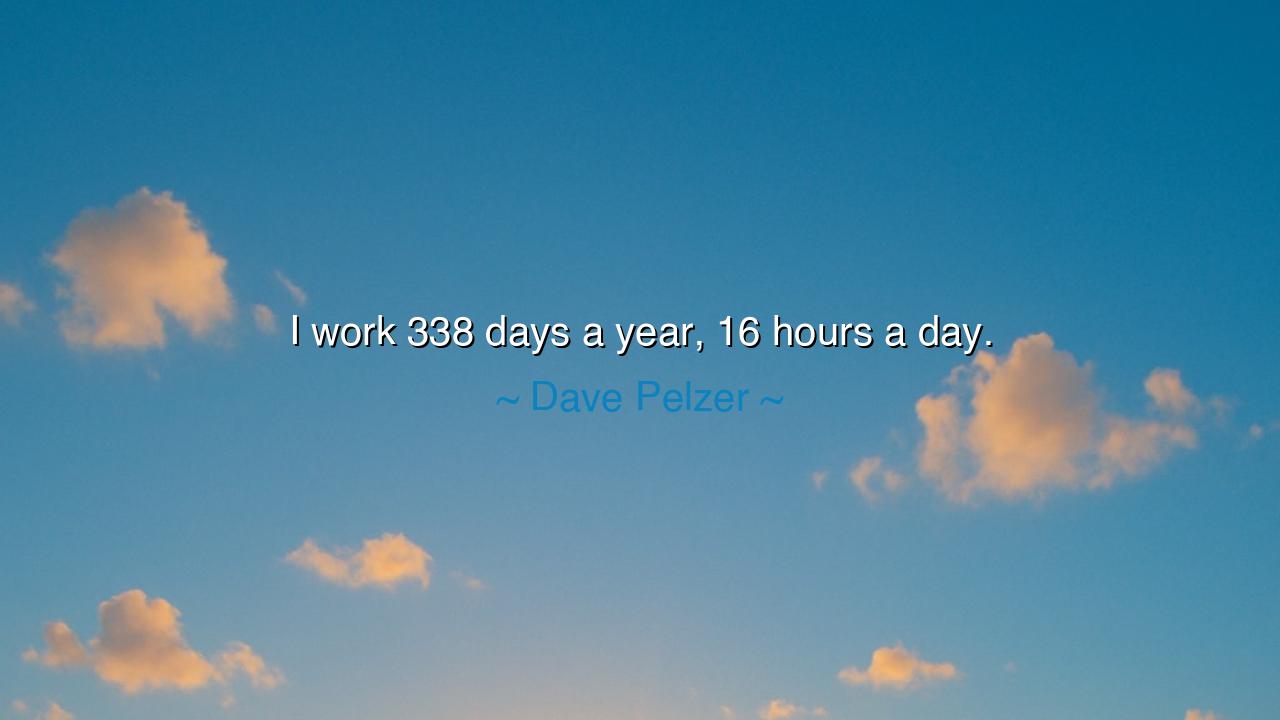
I work 338 days a year, 16 hours a day.






Hearken, children of the ages, to the words of Dave Pelzer, who speaks of the relentless pursuit of purpose: "I work 338 days a year, 16 hours a day." Here lies a teaching of dedication, perseverance, and the sacrifice demanded by greatness. Pelzer reminds us that the path of achievement is not paved with ease, but with tireless effort, discipline, and the willingness to endure where others falter.
Know that in these words there is both awe and solemnity. To work without pause, to devote nearly every day to labor and craft, is to forge the self in the fires of commitment. Pelzer teaches that mastery and impact are born not of fleeting effort, but of sustained exertion, where each day is claimed in service of a goal higher than comfort or leisure. The ancients would counsel that the diligent soul shapes destiny through constancy, patience, and unyielding resolve.
Yet, consider also the magnitude of sacrifice. To labor 16 hours a day, for 338 days, is to surrender much of worldly pleasure, to bend the body and sharpen the mind beyond ordinary limits. The work becomes a crucible, burning away distraction, weakness, and doubt, leaving only the essence of purpose and the strength of character. Pelzer’s insight teaches that true achievement demands both endurance and the courage to claim time as one’s ally.
And behold, there is heroism in this devotion. To commit to such relentless work is to embrace the hardships of life with courage, to persist where others yield, and to honor the calling of the soul with every waking hour. Pelzer reminds us that the labor of the devoted is a quiet but potent force, shaping not only the world, but the very nature of the one who dares to endure.
Thus, remember, future generations: greatness is not a gift, but the product of relentless work, discipline, and the mastery of self over comfort. To dedicate oneself fully, to claim each day for purpose, and to labor with unwavering focus is the path by which ordinary life is transformed into legacy.
In the end, the ancients would say: count not hours of ease, but hours of devotion. For the soul that works tirelessly, that bends each day to purpose, carves meaning from the mundane, and leaves a mark upon the world that echoes beyond mortality. To labor with courage and constancy is the highest expression of human spirit and enduring glory.






NPNhi Pham
Pelzer’s commitment to working long hours is undeniably impressive, but I’m curious – what does success really mean in this context? Is it measured by how many hours you put in, or by the quality of the results? With such a demanding schedule, how does one maintain creativity and mental clarity? Could working such extreme hours actually hinder innovation or passion in the long run?
DNThuy Duong Nguyen
I admire Dave Pelzer’s dedication, but is working this much sustainable for most people? Could working these kinds of hours without breaks lead to a decrease in productivity over time? Maybe taking time to rest and recharge is just as important as pushing through the grind. Is there a better, more balanced way to achieve success that doesn’t require sacrificing so much of our personal lives?
CTTOAN QUOC CONG TY
Working 16 hours a day for almost an entire year sounds like a recipe for exhaustion. Does this kind of work ethic truly bring happiness, or does it just mask deeper personal issues? Is this workaholism, or is it driven by a higher purpose? I wonder, in the quest for success, is it possible to lose sight of what truly matters, such as well-being and the ability to enjoy life’s simple pleasures?
GHNguyen Ngoc Gia Han
Pelzer’s quote is impressive, but I can’t shake off the concern about balance. What happens to the time needed for family, friends, and self-reflection when you’re working such extreme hours? While some people thrive under pressure, others might feel alienated or burned out by such intense schedules. How do we measure success – by the number of hours worked, or the fulfillment we gain from our work and relationships?
NANguyen Nhat Anh
The sheer number of hours and days Dave Pelzer claims to work is astonishing. It raises an interesting question about the value of hard work versus quality of life. Sure, hard work might lead to success, but is it worth it if it comes at the expense of health or personal time? Could we be sacrificing important moments for a future that may not even bring happiness? Where is the line between dedication and self-care?